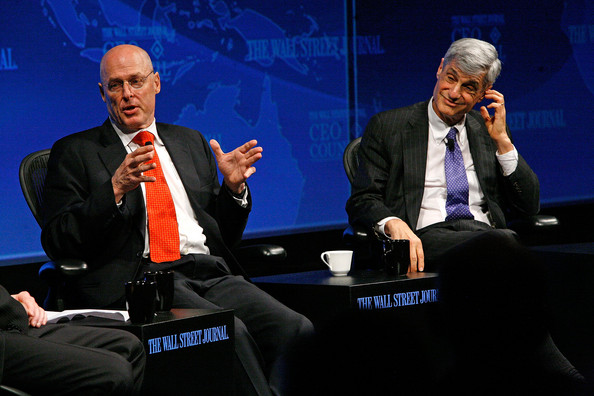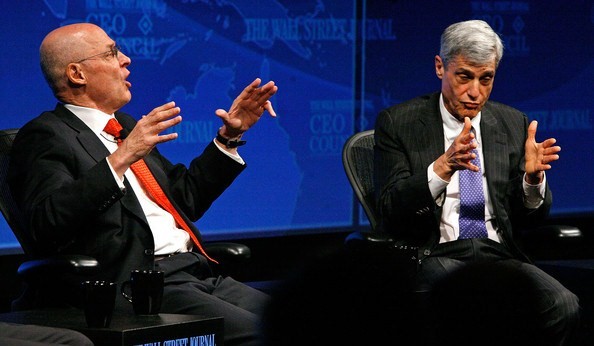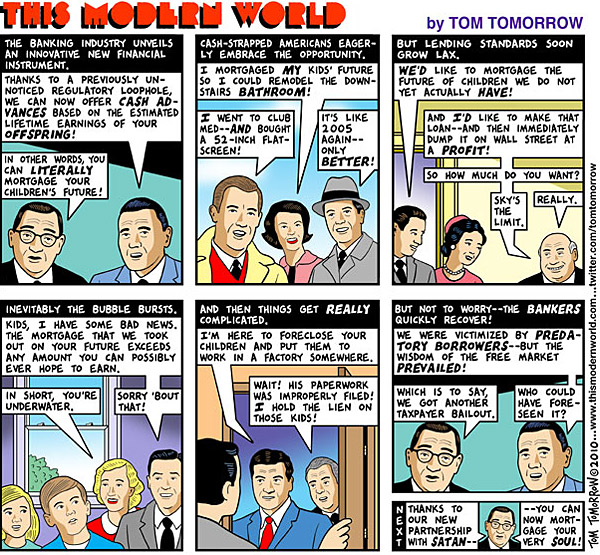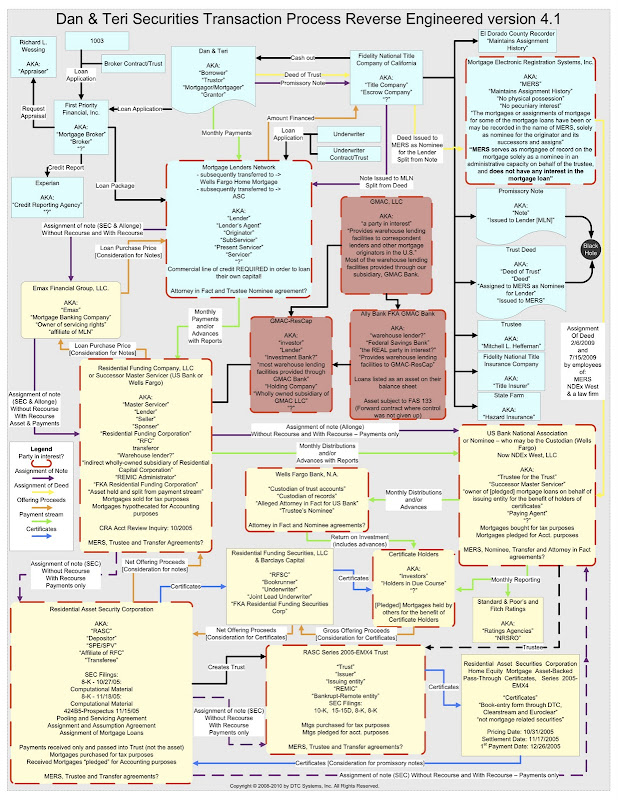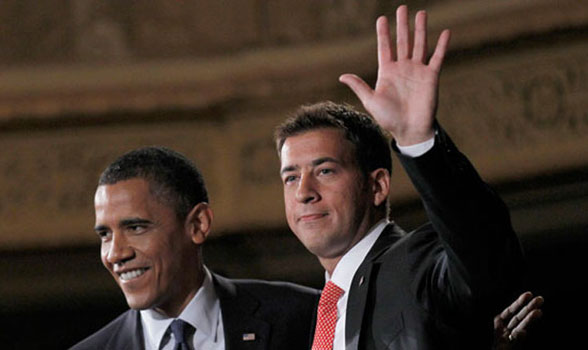The sky is black with PIIGS coming home to roost: I was going to write my customary long and boring think piece—but the simmering crisis in the Eurozone just got the heat turned up: Things are
boiling over there!
 |
| “Euro Dead” by Ryca. |
So let’s take a break from our regularly scheduled programming, and give you a run-down of this late-breaking news:
The bond markets have no faith in Ireland—Greece has been shown up as having lied
again about its atrocious fiscal situation—and now Portugal is teetering—
—in other words, the PIIGS are screwed. I would venture to guess that we are about to see this slow-boiling European crisis bubble over into a full blown
meltdown over the next few days—and it’s going to get messy.
So to keep everything straight, let’s recap:
The spreads on Irish sovereign debt widened, and the Germans are pressing them to accept a bailout—despite the fact that the Irish government is fully funded until the middle of 2011. But it’s not the Irish
fiscal situation that the bond markets or the Germans are worried about—it’s the Irish
banking sector that is freaking everyone out.
After all, the Irish government fully—and very foolishly—backed the insolvent Irish banks back in 2008. And for unexplained reasons, the Irish government is committed to honoring Irish bank bonds fully—which the country simply cannot afford. However,
German banks are heavily exposed to Irish banks, which explains why Berlin is so eager to have Ireland accept a bailout.
Right now, European Union, International Monetary Fund and European Central Bank officials are meeting with Irish representatives, putting together a bail-out package. The reason the Irish are so leery, of course, is that any bail-out would be accompanied by very severe austerity measures: In other words, the Irish people would suffer the consequences of shoring up the Irish banks—which is the same as saying the Irish people would suffer austerity measures in order to keep German banks from suffering losses. Also, the EU/IMF/ECB bail-out would probably also cost the Irish their precious 12.5% corporate tax rate—a key magnet for bringing capital to the Emerald Isle.
Add to the Irish worry, Greece is once again wearing a bright red conical dunce cap: They’ve been shown up to have lied
again about their fiscal situation. Three guesses what they lied about: If you guessed
Greek deficit, you win—yesterday, the Greek government officially revised its deficit figures: 15.4% for 2009, and 9.4% for 2010 (as opposed to an original 7.8% projection). Odds are good that these figures will be revised—for the worse—soon enough: Nobody believes anything other than Greece is insolvent.
That’s what’s going on this morning—and as a reaction,
the dollar (if you can believe it) is roaring back alive: As I write (noon EST), the Euro is at $1.3511, the Pound at $1.5870, gold down to $1,333 an ounce, silver $25.05 an ounce; the dollar is up ¥83.45.
There was no specific reason why things took a turn for the worse today—but this downturn of sentiment has been having a cascading/contagion effect through the rest of Europe:
As a result of the Irish not taking the EU bail-out, Portugal’s debt started to tumble—which has everyone worried. Portugal is looking an awful lot like Greece did five-six months ago: It’s debt spread over the German benchmark is 6.5%, and climbing. Even France’s debt yield spread widened against the German bund—it costs
more to insure French debt than it costs to insure
Chilean debt (I guess a good “
Viva Chile!” would be in order?).
The reason the entire slate of Euro bonds are tumbling is because of Ireland—but the real worry is Spain.
If Ireland and then Portugal go down the tubes, then it would only be a matter of time before Spain is next—and Spain is far larger than Greece, Ireland and Portugal combined.
If Spain goes, then it’s curtains for the whole Eurozone, perhaps even for the European Union as a political entity.
So Germany, the EU, the IMF and the ECB all want to save Ireland as a firewall, against further bond market deterioration.
The problem is, the Irish don’t want to be saved.
Ireland isn’t the only country that doesn’t want the EU/IMF/ECB bail-out of the Irish to happen. Several other EU countries
also do not want any more bail-outs, be it of Ireland or Greece or Portugal or anyone else:
Austria has just announced that it is withholding bailout funds to Greece,
according to Reuters. The reason, as articulated by Austria’s Finance Minister, Josef Proell, is that they are sick and tired of Greece’s bullshit. He was much more polite, of course, but essentially this is what he said. So Athens won’t be getting any of Austria’s money until there has been “extensive debate”.
Now, the Greek bailout is to the tune of €30 billion—Austria’s end is a measely €190 million: Six tenths of 1% of the total package. But for the political impact of the Austrian government’s decision, their contribution to the bailout fund could be twenty or thirty times as large. More than one government, and more than one political party, is working on slogans along the lines of, “If the Austrians can do it, why can’t we?”
Finland is another country openly unwilling to play ball vis-à-vis bailouts: The Finns have made it clear today that they are unwilling to put pressure on Ireland to accept an EU bailout. Again
according to Reuters, the Finns are opposed to bailing out Ireland because of an upcoming election, and popular opposition to more bail-outs. This makes sense, especially if you consider that Finland has been helping to bail out Iceland, and the Baltic countries, especially Latvia.
Now, of course, the bitching and moaning by small-fry Euro-nations in and of itself means nothing—except for two things:
One, the European Financial Stability Fund (EFSF) needs a unanimous vote to be activated to save Ireland, or anyone else.
If (and that’s a big if) the Irish finally tap this funding source, undoubtedly the EFSF would pay up—but in order to get that unanimity, a lot of political favors would have to be doled out to recalcitrant members.
And two, Austria and Finland’s objections to an Irish bailout is the visible articulation of differences that are raging privately in Berlin and Paris, and every other capital of Eurozone countries. The debate is between bail-outs, and letting the chips fall where they may.
Which brings us to a key point: There is clearly political exhaustion setting in. All these efforts to save all these small countries—Greece, Ireland, Portugal, the Baltics, Iceland—is leaving the European political leadership exhausted, not to mention leaving them out of bullets, as it were.
That’s because all these bail-outs have come at tremendous political costs, among the constituents of the nations doing the bailing out. The Finnish example—where clear and present political danger keeps the politicians from helping in a bail out—is a harbinger of things to come for the rest of Europe’s political leadership.
But even without this political exhaustion, one has to stop and consider an obvious truth: Some countries are simply too large to bail out.
What happens when Spain finally gets into serious trouble? It’s not an
if question anymore—not when Spain is running practically 20% unemployment, and a projected fiscal deficit this year of 9.3%,
according to Bloomberg. Just like Greece, Ireland and Portugal, eventually, the bond markets will turn on Spanish debt—it’s only a matter of time.
What will the EU and the ECB do then? Bail out Spain? Good luck with that—that’ll be like trying to hoist an elephant out of a septic tank with nothing but a smile: It simply cannot be done. Spain’s simply too big.
I think that these measures the European leadership is trying to carry out are simply postponing the inevitable. And what’s inevitable is a crash of the peripheral members of the Eurozone—the PIIGS plus Belgium. Because even
if the Irish are bailed out in the next day or two, in a few months time, we’ll have another round of panic, this time over Portugal. And by next summer, it is going to be Spain—
inevitably.
If Ireland is not sorted out—which at this point is in fact highly likely—then the Euro-bond market might well crash in the near-term, bring down not just Irish debt, but Portuguese, Spanish and Italian debt as well. Maybe even French debt. And that would be curtains for the Eurozone—maybe even the European Union.
In my post just last week,
The Tidal Forces Ripping Europe Apart, I argued that the stress of over-indebtedness coupled with an unwillingness to take haircuts and restructure the sovereign debt would rip the European Union apart.
I argued this would happen—I just didn’t think it would happen so
soon . . .
